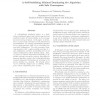28 search results - page 3 / 6 » Stability of Distributed Algorithms in the Face of Incessant... |
AINA
2005
IEEE
14 years 1 months ago
2005
IEEE
In this paper, we consider a distributed system that consists of a group of teams of worker robots that rely on physical robot messengers for the communication between the teams. ...
RAS
2010
13 years 5 months ago
2010
This paper presents the experimental validation of a recently proposed decentralized control law, for the collective circular motion of a team of nonholonomic vehicles about a vir...
HIPC
2003
Springer
14 years 21 days ago
2003
Springer
The use of feedback control techniques has been gaining importance in real-time scheduling as a means to provide predictable performance in the face of uncertain workload. In this ...
IPPS
2006
IEEE
14 years 1 months ago
2006
IEEE
A self-stabilizing distributed system is a faulttolerant distributed system that tolerates any kind and any finite number of transient faults, such as message loss and memory cor...
OPODIS
2010
13 years 5 months ago
2010
Abstract. Wireless Ad-hoc networks are distributed systems that often reside in error-prone environments. Self-stabilization lets the system recover autonomously from an arbitrary ...

